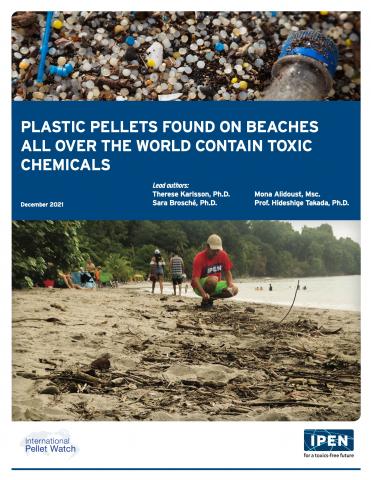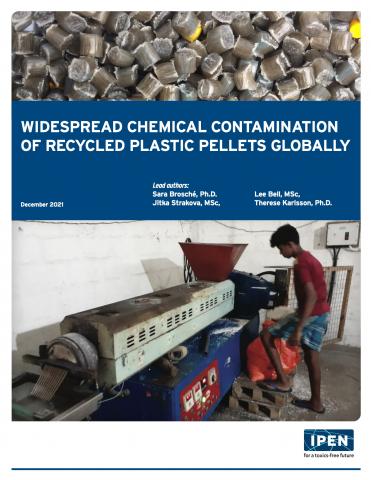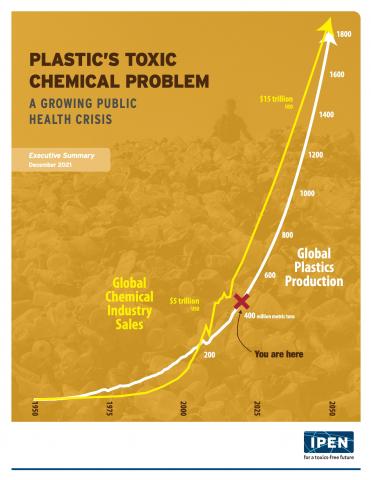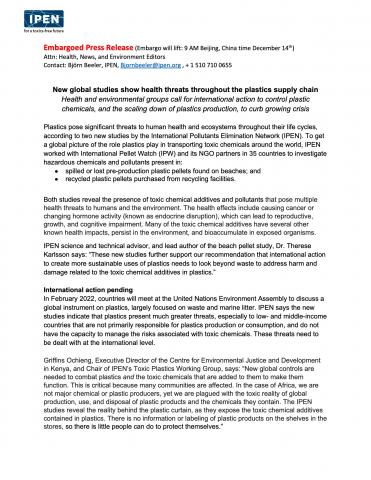New global studies show health threats throughout the plastics supply chain
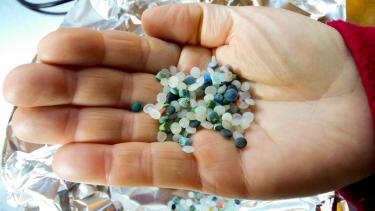
Gothenburg, Sweden Plastics pose significant threats to human health and ecosystems throughout their life cycles, according to two new studies by the International Pollutants Elimination Network (IPEN). To get a global picture of the role plastics play in transporting toxic chemicals around the world, IPEN worked with International Pellet Watch (IPW) and its NGO partners in 35 countries to investigate hazardous chemicals and pollutants present in:
- spilled or lost pre-production plastic pellets found on beaches; and
- recycled plastic pellets purchased from recycling facilities.
Both studies reveal the presence of toxic chemical additives and pollutants that pose multiple health threats to humans and the environment. The health effects include causing cancer or changing hormone activity (known as endocrine disruption), which can lead to reproductive, growth, and cognitive impairment. Many of the toxic chemical additives have several other known health impacts, persist in the environment, and bioaccumulate in exposed organisms.
IPEN science and technical advisor, and lead author of the beach pellet study, Dr. Therese Karlsson says: “These new studies further support our recommendation that international action to create more sustainable uses of plastics needs to look beyond waste to address harm and damage related to the toxic chemical additives in plastics.”
International Action Pending
In February 2022, countries will meet at the United Nations Environment Assembly to discuss a global instrument on plastics, largely focused on waste and marine litter. IPEN says the new studies indicate that plastics present much greater threats, especially to low- and middle-income countries that are not primarily responsible for plastics production or consumption, and do not have the capacity to manage the risks associated with toxic chemicals. These threats need to be dealt with at the international level.
Griffins Ochieng, Executive Director of the Centre for Environmental Justice and Development in Kenya, and Chair of IPEN’s Toxic Plastics Working Group, says: “New global controls are needed to combat plastics and the toxic chemicals that are added to them to make them function. This is critical because many communities are affected. In the case of Africa, we are not major chemical or plastic producers, yet we are plagued with the toxic reality of global production, use, and disposal of plastic products and the chemicals they contain. The IPEN studies reveal the reality behind the plastic curtain, as they expose the toxic chemical additives contained in plastics. There is no information or labeling of plastic products on the shelves in the stores, so there is little people can do to protect themselves.”
-
Press Release
Press release in English, Arabic, French, Russian, and Spanish.
Partner Press Releases
-
Presentations
Authors presenting the new reports at a press conference on 14 December 2021. All translations
The results of the recycled pellet study are particularly concerning for plastics recyclers. Report lead author and IPEN science advisor Dr. Sara Brosché says: “The widespread use of toxic chemical additives in plastic products makes a lot of recycled plastic waste an unacceptable raw material for making new products. Continued use of toxic chemical additives in plastics render most plastics in use today ‘non-circular’, thus excluding plastics from any circular economy.”
It is estimated (Wiesinger et al. 2021) that over 10,000 chemicals are present in plastics; around 5,000 of these are chemical additives that contribute to the function of products. Many of these chemicals are toxic, yet only a few are subject to regulatory control. In fact, regulatory information on the safety of many chemical additives is incomplete, and little is known about the risks of exposure to the complex mixtures of toxic pollutants currently being transported in and released from plastic pellets.
The chemicals assessed in the beach pellets study included ten ultraviolet (UV) stabilizers and 13 polychlorinated biphenyls (PCBs). The recycled pellets study assessed 11 flame retardants; bisphenol A; and six UV light stabilizers.
The international community has already taken some steps against plastics, primarily focusing on waste. But IPEN and IPW say all phases of plastics manufacture, transport, use, recycling, and disposal need to be addressed and regulators need to be more aware of the threats to health and ecosystems posed by the thousands of toxic chemical additives used in plastics.
IPEN is calling for an international plastics treaty to:
- Ban the use of toxic chemical additives in plastics, identify essential uses of plastics, scale down all other production and phase out all non-circular plastics;
- Apply extended producer responsibility programs to ensure industry bears the costs of plastics throughout their life cycle;
- Require essential uses of plastics to be designed for durability and reuse;
- Ensure end-of-life treatment of plastics waste does not release toxic chemicals, litter, or contribute to climate change, and ban waste export and incineration; and
- Include funding for implementation and monitoring.
In the meantime, as the chemical and plastic industries do not disclose what is in their products throughout the supply chain, greater transparency on toxic chemical additives used in plastics is needed, along with data on the quantities of plastics made, traded, and disposed of. It should be noted that the studies only reveal some of the toxic chemicals plastics.
###

